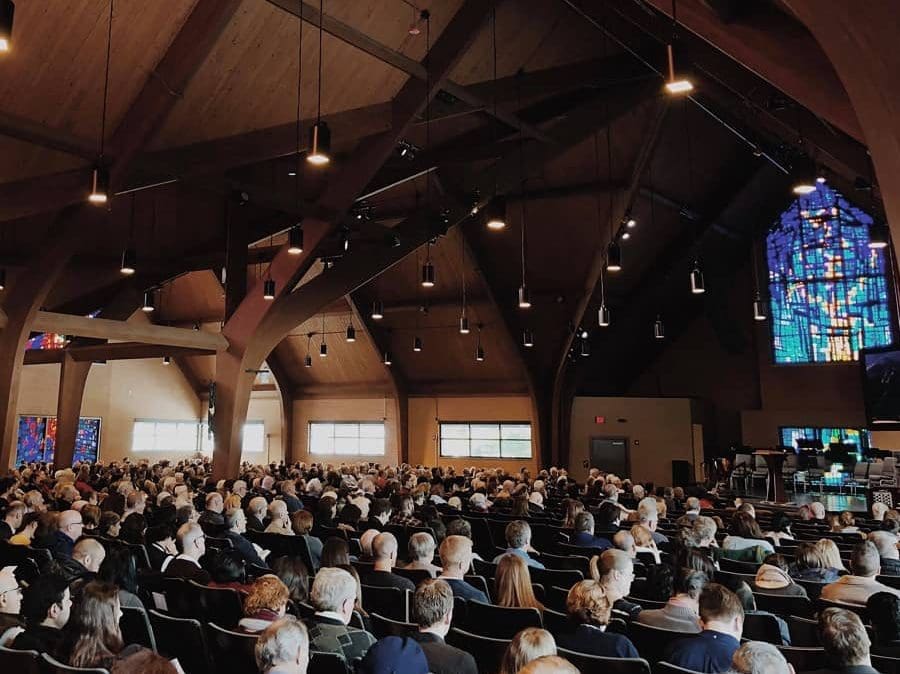
The Hike
Church
Ephesians 3:1–21

God’s great purpose is to display His glory by reconciling people to Himself and to each other. The church is central to this purpose. When we believe in Christ, we become part of His church that comprises all believers in every time and place. And God’s purpose is fulfilled when we worship and serve Him in a local congregation. Christ loves the church, and if we are His friends, we will love her too.
What is the first thing that comes to your mind when you hear the word church? Stained glass windows? Organ music? Robes? Candles? Appeals for money?
I regularly talk to people who are drawn to Jesus Christ but don’t think much of the church. We live in a highly individualistic society, and it is not always easy to see where the church fits in. What is the point of the church?
Some people say that the church exists for worship, but you can worship on your own or with a few friends. Others say that the church exists for evangelism. But evangelism flows out of relationships, so if you bear witness to Christ where He has placed you, why do you need the church? Others believe that we need the church for fellowship. But if you have deep relationships with a small group of friends, you will find a level of personal fellowship that you are unlikely to find in a larger congregation. So why do we need the church?
The problem goes deeper than the question of relevance. Some people say that their faith has been wounded by the church. A pastor or priest failed them, a congregation divided, or someone offended them, and it has been a barrier ever since.
It is important to face these questions honestly. The New Testament does. The apostles never suggested that the early churches were little colonies of heaven on earth. The New Testament letters speak about problems of sexual misconduct, legal wrangling, doctrinal errors, division over personalities, exaggerated claims about spiritual experiences, selfishness, lack of compassion, legalism, authoritarianism, pride, manipulative leaders, abuses of power, and misappropriation of funds. The list is depressing, but the honesty is refreshing.
Churches are communities of sinners in the process of being restored. But not everyone who claims that Jesus is their Lord will enter the kingdom of heaven. On the Last Day some preachers, ministry leaders, and church members will find themselves outside of God’s kingdom. Christ will say to them, “I never knew you” (Matthew 7:23).
God’s Eternal Purpose
Alongside the rigorous honesty that confesses and addresses the sins of the church, the Scriptures give us a vision of the church that we desperately need to recover. God’s purpose is “that through the church the manifold wisdom of God might now be made known to the rulers and authorities in the heavenly places” (Ephesians 3:10).
God’s purpose has always been to display His wisdom to a vast audience in heaven, and the way He does this is through the church.
God is drawing people from every nation of the world to Jesus, and gathering them into a new community—the church—that crosses the barriers of race, language, and culture. In God’s new community, “there is neither Jew nor Greek, there is neither slave nor free, there is no male and female, for you are all one in Christ Jesus” (Galatians 3:28).
Think about it! Jew and Arab, black and white, young and old, rich and poor all brought together in a new community. The world dreams of this. In Christ, we have a profound unity with each other that transcends everything that makes us different.
Let’s get specific. A Christian professor of astrophysics has more in common with an illiterate believer than with a fellow academic who does not know the Lord. A multimillionaire who knows Christ has more in common with the poorest believer than with friends in the yachting club who know nothing of Christ. A refined Christian woman who enjoys classical music has more in common with a high school rapper who loves Jesus than she does with her friends at the symphony who have never seen their need of a Savior!
The distinctions of education, income, and culture exist only for a time. But the unity of God’s people is eternal, and angels gasp when they see God’s wisdom on display through the church (Ephesians 3:10).
What Is the Church?
What exactly is the church? If three Christians meet at a bus stop every morning, are they a church? What if they talk about the Bible at Starbucks? Is your small group a church? Is a Christian family a church? And if not, why not?
A growing number of Christians have the idea that “church” is simply the plural of “Christian,” and that any group of Christians meeting at any time or place is a church. Are they right?
What did Jesus mean when He spoke about the church? Jesus used the word “church” twice and what He said defines the church for us. The first time was when Peter confessed that Jesus is the Christ. Jesus said to him: “I tell you, you are Peter, and on this rock I will build my church, and the gates of hell shall not prevail against it” (Matthew 16:18).
Christ is not speaking here about a local church or a denomination, but about all believers at every time and in every place. There is one church, comprised of all believers, and Christ builds it.
The “gates of hell shall not prevail against” this church (16:18). You can’t say that about any local church or denomination. All over the world there are sad stories of churches and denominations that have lost their way and closed. But the church that Christ is building is alive and well. It encompasses all believers at every time and in every place.
The second time Jesus spoke about the church, He said, “If your brother sins against you, go and tell him his fault, between you and him alone… But if he does not listen, take one or two others along with you… If he refuses to listen to them, tell it to the church” (Matthew 18:15–17).
The word “church” here clearly has a different meaning. It cannot mean: “Tell it to all believers in every age and in every place.” No one could do that. Jesus was clearly speaking here about a local congregation of believers.
So, our Lord used the word church in two ways: First, to describe all believers in every time and place. Second, to describe a local congregation of believers.
The church is not a self-selecting group of people. It’s never just you, me, and a few friends who we’ll choose. Christ builds His church as He brings people to faith in Himself and gathers them together in local congregations.
Cinderella Will Go to the Ball
There is a big difference between what the church is now and what the church one day will be:
Christ loved the church and gave himself up for her, that he might sanctify her, having cleansed her by the washing of water with the word, so that he might present the church to himself in splendor, without spot or wrinkle or any such thing, that she might be holy and without blemish. (Ephesians 5:25–27)
Once upon a time, there was a little girl who had a wicked stepmother and two ugly sisters. She was made to work in the kitchen and used to sit in her ragged clothes among the cinders, so they called her Cinderella.
One day the king invited all the maidens in the land to a grand ball in his palace. He wanted his son, the prince, to fall in love and to marry. The ugly sisters were taken to the ball, but Cinderella had no dress to wear—and she was left at home.
Then the fairy godmother touched her with the wand, and Cinderella’s rags were turned into a beautiful dress—but only until midnight.
When Cinderella arrived at the ball, she captivated the prince’s heart. And they danced until midnight, when she had to leave. But as Cinderella ran from the ballroom, one of her glass slippers fell off.
The prince was determined to find the woman he loved. He ordered that the slipper be tried on the foot of every maiden in the land, and that the one to whom it belonged should be brought to the palace.
Picture Cinderella sitting at home. She is dressed in rags, despised by the ugly sisters and oppressed by the wicked stepmother. But her destiny is a life of love and joy in the palace.
That’s a wonderful picture of the church. She sometimes looks a bit ragged. There are some rather ugly brothers and sisters who despise her and count her as of little value. There are parts of the world where a wicked stepmother persecutes her and imprisons her. But Christ loves the church, and He will bring her home.
When Christ presents the church to himself, we will not be in rags and tatters. The church will be “without spot or wrinkle or any such thing… holy and without blemish” (Ephesians 5:27). The church will be radiant. She will be glorious. And she will share Christ’s joy forever.
Always remember that the church is the bride that Christ will present to Himself. Christian schools, seminaries, radio ministries, missionary societies, and evangelistic organizations are like bridesmaids who assist the bride as she gets ready for the bridegroom. The bride needs her bridesmaids, but it’s a great mistake to make more of the bridesmaids than you do of the bride.
At the end of the Bible, John the Apostle hears the voice of a great multitude crying out from heaven, “Hallelujah! For the Lord our God the Almighty reigns. Let us rejoice and exult and give him the glory, for the marriage of the Lamb has come, and his Bride has made herself ready… Blessed are those who are invited to the marriage supper of the Lamb” (Revelation 19:6–9).
Opened
The church is a work in progress. She is not yet all that God calls her to be, and she is not yet what one day she will be. But the church is the bride of Christ. He laid down His life for her, and she is central to the purpose of God.
The Heidelberg Catechism answers the question: “What do you believe about the church?” with these words: “I believe that the Son of God, through His Spirit and Word, out of the entire human race, from the beginning of the world to its end, gathers, protects, and preserves for Himself, a community chosen for eternal life and united in true faith. And of this community I am and always will be a living member.” I cannot imagine a greater privilege than that.
Ephesians 3:1–21
The Mystery of the Gospel Revealed
1 For this reason I, Paul, a prisoner of Christ Jesus on behalf of you Gentiles—2 assuming that you have heard of the stewardship of God’s grace that was given to me for you, 3 how the mystery was made known to me by revelation, as I have written briefly. 4 When you read this, you can perceive my insight into the mystery of Christ, 5 which was not made known to the sons of men in other generations as it has now been revealed to his holy apostles and prophets by the Spirit. 6 This mystery is that the Gentiles are fellow heirs, members of the same body, and partakers of the promise in Christ Jesus through the gospel.
7 Of this gospel I was made a minister according to the gift of God’s grace, which was given me by the working of his power. 8 To me, though I am the very least of all the saints, this grace was given, to preach to the Gentiles the unsearchable riches of Christ, 9 and to bring to light for everyone what is the plan of the mystery hidden for ages in God, who created all things, 10 so that through the church the manifold wisdom of God might now be made known to the rulers and authorities in the heavenly places. 11 This was according to the eternal purpose that he has realized in Christ Jesus our Lord, 12 in whom we have boldness and access with confidence through our faith in him. 13 So I ask you not to lose heart over what I am suffering for you, which is your glory.
Prayer for Spiritual Strength
14 For this reason I bow my knees before the Father, 15 from whom every family in heaven and on earth is named, 16 that according to the riches of his glory he may grant you to be strengthened with power through his Spirit in your inner being, 17 so that Christ may dwell in your hearts through faith—that you, being rooted and grounded in love, 18 may have strength to comprehend with all the saints what is the breadth and length and height and depth, 19 and to know the love of Christ that surpasses knowledge, that you may be filled with all the fullness of God.
20 Now to him who is able to do far more abundantly than all that we ask or think, according to the power at work within us, 21 to him be glory in the church and in Christ Jesus throughout all generations, forever and ever. Amen.
(ESV)
Use these questions to further engage with God's Word. Discuss them with another person or use them as personal reflection questions.

Take the First Step to Open Your Bible
Join 35,000+ people who get ‘Open Weekly’. Every Wednesday, you’ll get hand-picked resources designed to inspire, encourage, and challenge you in opening your Bible.
Listen NOW!
The HIKE Through the Bible podcast is now streaming! Join Pastor Colin for a leisurely hike through the entire Bible story. In every episode he reads a chapter from his new book HIKE Through the Bible and then discusses it with some friends.
Join Pastor Colin In-Person!
Do you want to understand the Bible story? 📖
Pastor Colin Smith’s upcoming event FLY THROUGH THE BIBLE, is a high-altitude exploration of the entire Bible story. This brief introduction to the Bible will help you grasp who God is, who you are, who Jesus is, and what He offers to you!
Coming to 4 cities this fall:
- St. Louis, Missouri
- Twin Cities, Minnesota
- Des Moines, Iowa
- Indianapolis, Indiana
Will you join us?

It looks like you're viewing the site from outside the US. Click below to visit our UK site or close this pop-up to view the international site.

